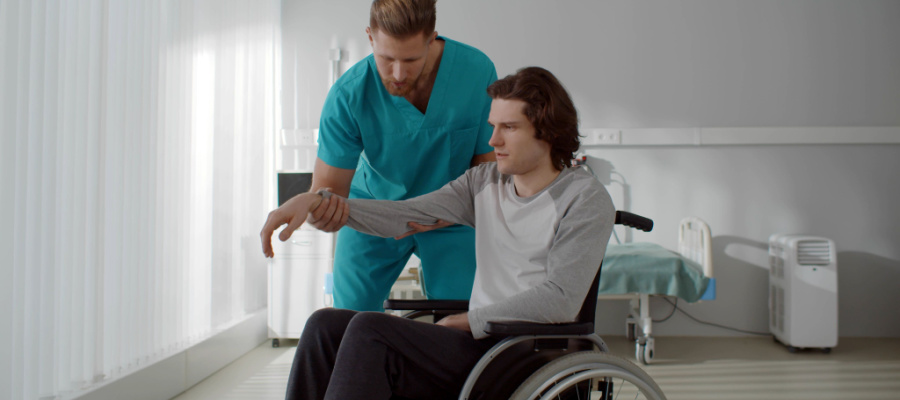Can You Still Talk If You Are Paralyzed?
Paralysis is a condition that can drastically change a person’s life, affecting their ability to move, perform daily activities, and in some cases, communicate. For individuals with paralysis, the ability to speak and communicate clearly is often a major concern. Whether the paralysis is the result of a spinal cord injury, stroke, neurological disorder, or another cause, many individuals worry about their ability to talk and engage in conversation.
At Devoted Helpers, an in-home care provider in Sugar Land, Texas, we understand the importance of communication in maintaining quality of life and emotional well-being. In this article, we’ll explore how paralysis may impact speech and communication, and the ways that individuals can continue to interact and express themselves despite the challenges they face.
What Is Paralysis?
Paralysis occurs when there is a loss of muscle function and sensation in part or all of the body. It can happen as a result of spinal cord injuries, stroke, neurodegenerative diseases (like ALS or Parkinson’s disease), or other medical conditions that damage the nervous system. Depending on the severity and location of the injury or condition, paralysis can be partial or complete.
The extent of paralysis and its effects on speech depends on the level and type of injury. Some people may experience paralysis in their arms or legs, while others may have impairments that affect their ability to speak or breathe properly.
How Does Paralysis Affect Speech?
Paralysis can affect speech in different ways, depending on which part of the nervous system is involved. Here’s how paralysis can impact the ability to talk…
a. Paralysis of the Vocal Cords and Larynx
The ability to speak relies on the proper function of the vocal cords (also called vocal folds), which are located in the larynx (voice box). These vocal cords vibrate as air passes through them, allowing sound to be produced. If the nerves that control the vocal cords are damaged—whether by a stroke, spinal cord injury, or other conditions—it can lead to difficulty speaking or the complete loss of speech.
- Stroke – A stroke can cause paralysis or weakness in the muscles that control the vocal cords. When these muscles are affected, a person may experience slurred speech, hoarseness, or even a complete inability to speak.
- Spinal cord injury – A spinal cord injury affecting the upper cervical region (C1-C4) can interfere with the muscles required for breathing and speaking. This can result in difficulty or the complete loss of voice.
b. Difficulty with Breathing and Respiration
Another factor that impacts speech is breathing. Speaking requires controlled exhalation of air, which is something individuals with paralysis, especially high-level spinal cord injuries, may find challenging. Paralysis of the diaphragm or respiratory muscles can make it difficult to take deep breaths, speak in full sentences, or project one’s voice.
Individuals who suffer from quadriplegia or tetraplegia, which affects all four limbs and can impair respiratory muscles, may require assistance with breathing, often using ventilators or other supportive devices. This can make speech more difficult, but not necessarily impossible.
c. Neurological Disorders Impacting Speech
Some neurological conditions that cause paralysis can also affect the muscles involved in speech. Conditions such as ALS (amyotrophic lateral sclerosis), Parkinson’s disease, or multiple sclerosis (MS) can weaken the muscles responsible for articulation and swallowing, leading to slurred speech or difficulty forming words.
- ALS – As the disease progresses, patients may lose the ability to speak clearly due to muscle weakness. Over time, speech can become more difficult to understand, and alternative communication methods may be needed.
- Parkinson’s disease – A condition that causes tremors and muscle stiffness can also affect a person’s ability to speak clearly. People with Parkinson’s may have difficulty controlling their voice volume, resulting in a softer or monotone voice.
Can People with Paralysis Still Talk?
While paralysis can impact the ability to speak, it is crucial to know that many individuals with paralysis can still communicate effectively, especially with the right support and adaptations. The ability to speak depends on the type and level of paralysis, but in many cases, individuals retain the cognitive and emotional ability to communicate, even if their speech is affected.
Here are a few factors to consider…
a. Partial Paralysis and Mild Speech Impairment
In cases of partial paralysis, many individuals can still speak, though they may experience slurred or quieter speech. For example, someone with hemiplegia (paralysis on one side of the body) may have weakened vocal cords or limited mouth movement, but they can still communicate through speech with assistance from a speech therapist or communication devices.
b. Use of Augmentative and Alternative Communication (AAC)
For individuals who lose the ability to speak due to paralysis, there are several alternative communication methods available. These can include…
- Speech-generating devices – These devices use text-to-speech technology, enabling individuals to type out their words, which are then spoken by the device.
- Eye-tracking technology – For individuals who have limited or no use of their hands, eye-tracking devices allow them to communicate by selecting words or letters on a screen with their eye movements.
- Communication boards – These are simple tools with symbols, letters, or words, which allow individuals to point to or select options to convey their message.
- Smartphone apps – There are numerous apps designed to assist with speech communication for those who have difficulty speaking. These apps offer various ways to express needs and thoughts without the use of vocal cords.
c. Speech Therapy and Rehabilitation
Individuals who have lost the ability to speak clearly or at all can often benefit from speech therapy. Speech-language pathologists (SLPs) work with patients to improve their ability to speak, eat, and swallow. For some individuals, therapy can help retrain the muscles responsible for speech or provide strategies for effective communication despite limited function.
Therapy may include…
- Breathing exercises – To improve breath control and the ability to speak in longer sentences.
- Articulation techniques – To improve clarity of speech.
- Strengthening vocal cords – To help individuals with weakness or paralysis regain some control over their voice.
How Devoted Helpers Can Assist with Communication
At Devoted Helpers in Sugar Land, Texas, we recognize the importance of communication for people living with paralysis. Our team of experienced caregivers is trained to support individuals with paralysis in various ways, ensuring that they can express their needs and desires comfortably.
Our services include…
- Speech support – Assistance with speech therapy exercises and using augmentative communication devices.
- Personal care – Helping with daily activities and ensuring comfort, which can assist in minimizing the stress and frustration that often comes with communication challenges.
- Emotional support – Providing companionship and encouraging meaningful conversations to reduce feelings of isolation.
- Technology assistance – Helping with the setup and use of communication devices or apps for patients who need non-verbal ways to communicate.


